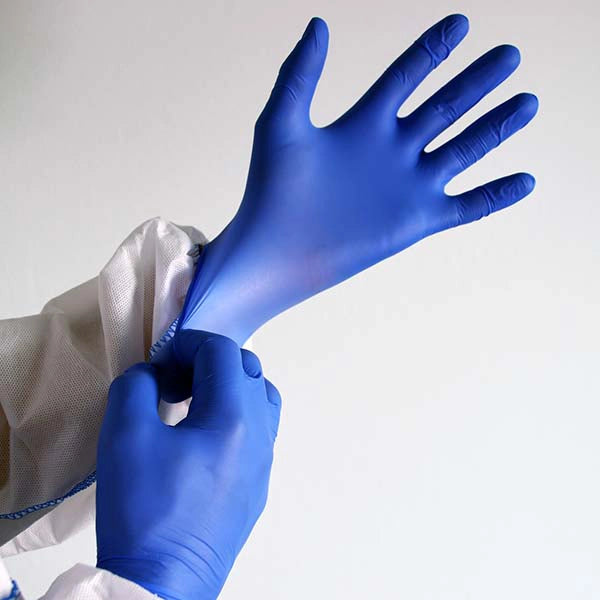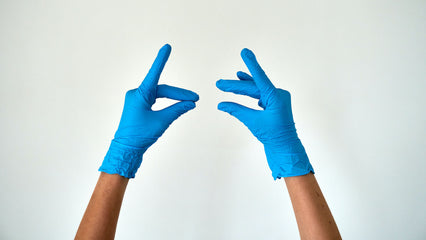Soft and comfortable, vinyl gloves should make it onto everyone's shopping list. Not only will you find work them in kitchens across the country, but they are also used in a variety of professions outside of the culinary industry.
Vinyl gloves are similar to latex gloves when it comes to chemistry and general appearance. But instead of natural latex, vinyl gloves use synthetic compounds for the rubber-like material that creates airtight and watertight barriers. That makes them great for protecting sensitive skin from all sorts of chemicals, including cleaners, solvents, and acids.
Vinyl gloves are available in a wide range of materials, colors, and sizes. They are produced in many different ways, each with its own unique benefits. If you're looking to buy some vinyl gloves for your next project or event, read this detailed guide for more information.
What Are Vinyl Disposable Gloves
Vinyl gloves are made from PVC, a petroleum-based film. The primary benefit of vinyl gloves is that they’re inexpensive to manufacture. That being said, they are less durable than latex and nitrile, and they offer limited protection against chemical or biomedical exposure.
Vinyl gloves are made of a type of plastic called PVC, which is short for polyvinyl chloride. This material is a synthetic (man-made) polymer that's used in many applications, such as cables, pipes and medical devices, wire insulation, and cables.
Vinyl gloves are used in everyday life for tasks such as gardening and handling chemicals, because they are relatively inexpensive and provide a measure of protection to the skin. In fact, vinyl gloves are the least expensive option available.
While this may sound great, the downside is they offer less protection than latex or nitrile. When vinyl gloves are stretched, the individual molecules inside separate from one another. This weakens the material and makes the gloves less effective at protecting your hands.
Despite this, vinyl gloves are still an affordable option when a strong barrier of protection isn't necessary like in kitchens and restaurants.
What Are Vinyl Gloves Made Of?
Vinyl gloves are made from polyvinyl chloride (PVC), a type of synthetic plastic polymer. To enhance their flexibility and durability, plasticizers such as phthalates are added during the manufacturing process. These plasticizers soften the PVC, making the gloves more pliable and comfortable to wear.
Vinyl gloves are latex-free, making them a suitable option for individuals with latex allergies or sensitivities. They are commonly used in medical, food handling, and cleaning applications due to their affordability and resistance to oils and fats.
What Are Vinyl Gloves Used For?
Vinyl gloves are used in the food industry, medical settings as well as home improvement, pharmaceutical, and chemical industries. Some of their most common uses include:
- Food Preparation (except for greasy food): Vinyl gloves certified are safe to wear while preparing nonfatty foods, such as those found in a restaurant kitchen or at a hospital cafeteria. However, you cannot use vinyl gloves with oily, greasy, or fatty food. The oils may leach out the softening agents into the food, causing the glove to become brittle.
- Low-risk Work: For fast, low-risk tasks that may involve contact with small amounts of non-hazardous liquids and body fluids (for example, during manual handling of blood samples), vinyl gloves work well.
- Light Electrical Jobs: These gloves are also useful when working with wires and cables. Stripping back their sheaths with tools can cause static electricity, so these gloves protect hands from chafing.
- Basic Cleaning Tasks: For most basic cleaning tasks, like dusting or mopping, vinyl gloves will work as a protective barrier as long as you deal with non-hazardous chemicals only.
- Painting and printing: Vinyl gloves make ideal hand protection for painting and dyeing. They're easy to slip on or off quickly, and they provide great coverage while keeping hands clean.
Advantages of Vinyl Disposable Gloves
Vinyl gloves are thin and lightweight like a latex glove, premium in appearance, and much easier to put on and take off relative to a latex glove. Here's what you need to know about using them.
- Affordable - Vinyl gloves are less durable and not as puncture-resistant as their counterparts, but they are cheaper than nitrile and latex gloves. That makes vinyl gloves perfect for jobs where the gloves won't be used for long periods of time, or when frequent changing of gloves is required.
- Latex-free gloves - If you are allergic to latex, you can use disposable vinyl gloves instead. They do not run the risk of allergic reactions associated with natural rubber latex (NRL) gloves. These gloves are also usually less expensive than those made of latex and are available in different sizes and colors.
- Versatility - Vinyl gloves are good for a short period of time when you're doing low-risk tasks, like mixing colors or preparing a sandwich. They are also great for general purpose use like food preparation, house cleaning, and many other tasks requiring simple handling of everyday objects.
- Protection -These disposable gloves provide a great way to protect your hands in non-hazardous environments. They also offer protection against common chemicals like detergents and also help protect against cross-contamination from body fluids and laundry liquids, too.
- Easy Wear and Removal - Vinyl gloves are designed so that they fit more loosely than other types of gloves, making them easy to don on and off. If you need to put on and remove gloves quickly, vinyl gloves are often a better choice than other kinds of gloves.
- Safe to Use - Vinyl gloves are safe to use in the workplace where latex allergies may be present. Furthermore, vinyl gloves have a longer shelf life because they are synthetic and non-biodegradable.
- Anti-static Properties - Anti-static gloves help dissipate static charges when worn by someone handling delicate, static-prone products. Anti-static gloves are commonly used by people who perform electronic repair, inspection, and cleaning of equipment. Made from synthetic rubber which is an insulator, vinyl gloves are generally inherently anti-static.
Vinyl Glove and Latex Allergies
According to the Asthma and Allergy Foundation of America, between 8 to 17% of health care workers and others who regularly use latex gloves are allergic to latex. The likelihood of getting an allergy to latex increases for those who have had contact dermatitis and are allergic to other substances.
The symptoms can range from mild to serious and even life-threatening. So how does it work? The protein found in natural rubber can cause an allergic reaction, which then leads to the release of chemicals and histamines into the body. These chemicals are released into the body when natural rubber is exposed to a person with an allergy. The exposure can happen through direct skin contact or by swallowing.
In recent years, latex allergies have become more of a threat, especially in the medical community. The Federal Food and Drug Administration (FDA) passed a law stating that all products containing latex must warn users of this possible danger, so as not to harm both them and those around them. FDA requires all medical devices to include a statement on the label that says, “Caution: This Product Contains Natural Rubber Latex Which May Cause Allergic Reactions.”
If you want to avoid an allergic reaction to latex, be sure to choose the right type of gloves. The right glove, like vinyl, can prevent an unpleasant encounter with latex.
Does Vinyl Glove Cause Allergies
It is extremely rare for anyone to have an allergic reaction to vinyl gloves. People who think they are experiencing an allergy may actually be having a skin irritation (contact urticaria) caused by a lack of ventilation in the glove.
Because vinyl gloves are waterproof, they make your hands sweat after being worn for a length of time. The moisture from perspiration and heat gets trapped inside the glove. This causes the skin to become irritated making it uncomfortable.
So, what is Contact Urticaria? Contact urticaria is a type of allergic reaction that causes the skin to be inflamed when exposed to the substance that has triggered the allergy. It can be caused by exposure to a number of substances. The symptoms of contact urticaria tend to last for a short period. It usually clears up within 24 hours of removing the cause of the allergic reaction.
It is caused by the body's reaction to our own histamine being released into the skin. Histamine is a natural substance found in every human body, made there as a defense against outside bacteria and viruses.
To keep your hands dry, wear fabric liners that absorb sweat as a thin layer between them and the glove. They can either be built into the glove or worn as a separate layer inside the glove. However, this thickens the overall hand defense, reducing mobility and finger dexterity.
Allergic reactions to wearing gloves are not always caused by latex. Other chemical additives in the gloves can cause allergic reactions or irritant contact dermatitis in the person wearing them. Vinyl gloves contain many chemicals, including carba mix, mercaptobenzothiazole (MBT), thiuram mix, combined dialkyl thioureas, black rubber mix, and petroleum.
Another type of reaction may be leakage. If you wear disposable gloves too long, they may tear or leak, allowing contact with chemicals, irritants, and other hazardous substances.
Using vinyl gloves with care and according to FDA standards, your chances of experiencing any type of allergic reaction are low.
Why gloves.com is the Best Option to Buy Vinyl Gloves
Vinyl gloves are an essential item for a variety of tasks, providing a cost-effective, latex-free alternative that is suitable for many applications. Whether you need them for food preparation, light cleaning, or low-risk tasks, vinyl gloves offer a reliable barrier of protection. For those looking to purchase high-quality vinyl gloves, gloves.com is the best option.
With a wide range of sizes and colors, excellent customer service, and competitive pricing, gloves.com ensures you get the best products to meet your needs. Take advantage of their 50% discount on orders and make Gloves.com your go-to source for vinyl gloves.
What Are Vinyl Gloves: Frequently Asked Questions
What are the disadvantages of vinyl gloves?
Vinyl gloves are less durable and offer lower protection compared to latex and nitrile gloves. They are more prone to tears and punctures, making them less suitable for tasks that involve handling sharp objects or exposure to harsh chemicals. Additionally, vinyl gloves provide a looser fit, which can reduce tactile sensitivity and make them less comfortable for prolonged use.
Are vinyl gloves any good?
Vinyl gloves are a good option for many low-risk tasks due to their affordability and latex-free composition. They are suitable for food handling, light cleaning, and general-purpose use. However, for tasks requiring higher durability and protection, nitrile or latex gloves are often a better choice.
Are vinyl gloves irritating?
Vinyl gloves are generally less likely to cause allergic reactions compared to latex gloves, as they do not contain natural rubber proteins. However, some individuals may experience skin irritation due to the plasticizers and other chemicals used in the manufacturing process. If you have sensitive skin, it is advisable to test the gloves first or consult with a dermatologist.
Is vinyl stronger than latex?
No, vinyl is not stronger than latex. Latex gloves offer superior elasticity, strength, and comfort, making them more suitable for tasks that require a high level of dexterity and protection. Vinyl gloves are more prone to breaking and provide less barrier protection compared to latex gloves.






